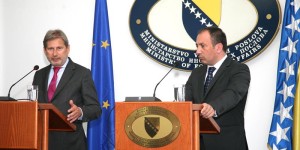Under Secretary General,
Ministers,
Ladies and gentlemen,
On behalf of the European Union, I would like to confirm today our commitment to help solving the remaining problems of displacement.
We do so in the presence of our partners from the authorities in BiH and the international community.
At the occasion of your visit, Ms Clark, let me express our appreciation for the strong contribution that the United Nations is making to this joint effort, and for our close partnership.
Bosnia and Herzegovina, the European Union and the United Nations are indeed united in their policy and their resolve to ensure sustainable solutions to the problem of displacement, as well as the closing of collective centres.
Last year, the European Union has pledged 230 Million € for a Regional Programme providing housing solutions for refugees in Bosnia and Herzegovina, Croatia, Montenegro and Serbia.
And we will complement this assistance through support of the implementation of the Revised Annex VII of the Dayton Agreement.
7 million € have already been allocated under the National IPA Programme 2012, and the same amount is proposed under the National IPA Programme 2013.
The implementation of both the Regional Housing Programme and the National IPA programmes draws on the long standing expertise of the United Nations, and its lead institution in the sector, the UNHCR.
We are fully aware, and this is the core of the declaration we are signing today, that assistance in the form of housing alone is not sufficient to ensure durable solutions.
It is necessary to link housing solutions for the most vulnerable with the delivery of services, be it in the area of legal aid, employment, education, or social inclusion and protection benefits such as health insurance or pensions.
And the sustainability of returns and local integration will on the longer term depend on the economic and social development of the communities where returnees and displaced are living. This, I believe, is one of the key challenges for the medium and long term, and one that we need to address under future programmes.
The coordination of all existing programmes, the Regional Housing Programme, the National IPA projects, the Council of Europe Development Bank Programme for the closing of collective centres, may perhaps be compared with a symphony concert, in which many different players with their instruments perform together.
The players are not only the institutions signing the Joint Declaration today, but many other ministries and authorities from the level of the state to the level of the municipalities. Like in a concert, all have to perform in a synchronized and collaborative manner, and play their part at the right time: from the provision of funds to the planning of implementation, from the prioritization of beneficiaries based on needs to the provision of housing and of complementary measures, from support to individuals to community based approaches and the adoption of policies.
It is our hope that the Declaration we are signing today will contribute to this concerted effort, in the interest of all displaced who are still in need of finding a long term solution.
Thank you



